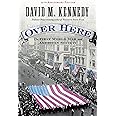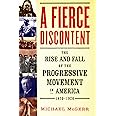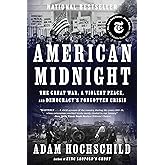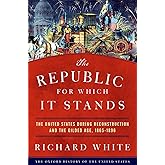
Enjoy fast, free delivery, exclusive deals, and award-winning movies & TV shows with Prime
Try Prime
and start saving today with fast, free delivery
Amazon Prime includes:
Fast, FREE Delivery is available to Prime members. To join, select "Try Amazon Prime and start saving today with Fast, FREE Delivery" below the Add to Cart button.
Amazon Prime members enjoy:- Cardmembers earn 5% Back at Amazon.com with a Prime Credit Card.
- Unlimited Free Two-Day Delivery
- Streaming of thousands of movies and TV shows with limited ads on Prime Video.
- A Kindle book to borrow for free each month - with no due dates
- Listen to over 2 million songs and hundreds of playlists
- Unlimited photo storage with anywhere access
Important: Your credit card will NOT be charged when you start your free trial or if you cancel during the trial period. If you're happy with Amazon Prime, do nothing. At the end of the free trial, your membership will automatically upgrade to a monthly membership.
Buy new:
-16% $18.57$18.57
Ships from: Amazon.com Sold by: Amazon.com
Save with Used - Acceptable
$11.46$11.46
Ships from: Amazon Sold by: 2nd Life Aloha

Download the free Kindle app and start reading Kindle books instantly on your smartphone, tablet, or computer - no Kindle device required.
Read instantly on your browser with Kindle for Web.
Using your mobile phone camera - scan the code below and download the Kindle app.

OK
 Audible sample Sample
Audible sample Sample 


Over Here: The First World War and American Society 25th anniversary Edition
Purchase options and add-ons
Over Here is the single-most comprehensive discussion of the impact of World War I on American society. This 25th anniversary edition includes a new afterword from Pulitzer Prize-winning author David M. Kennedy, that explains his reasons for writing the original edition as well as his opinions on the legacy of Wilsonian idealism, most recently reflected in President George W. Bush's national security strategy. More than a chronicle of the war years, Over Here uses the record of America's experience in the Great War as a prism through which to view early twentieth century American society. The ways in which America mobilized for the war, chose to fight it, and then went about the business of enshrining it in memory all indicate important aspects of enduring American character. An American history classic, Over Here reflects on a society's struggle with the pains of war, and offers trenchant insights into the birth of modern America.
- ISBN-109780195173994
- ISBN-13978-0195173994
- Edition25th anniversary
- PublisherOxford University Press
- Publication dateOctober 7, 2004
- LanguageEnglish
- Dimensions8.03 x 5.39 x 0.87 inches
- Print length448 pages
Books with Buzz
Discover the latest buzz-worthy books, from mysteries and romance to humor and nonfiction. Explore more
Frequently bought together

Similar items that may deliver to you quickly
Editorial Reviews
Review
Book Description
About the Author
Product details
- ASIN : 0195173996
- Publisher : Oxford University Press; 25th anniversary edition (October 7, 2004)
- Language : English
- Paperback : 448 pages
- ISBN-10 : 9780195173994
- ISBN-13 : 978-0195173994
- Item Weight : 1.05 pounds
- Dimensions : 8.03 x 5.39 x 0.87 inches
- Best Sellers Rank: #534,649 in Books (See Top 100 in Books)
- #661 in World War I History (Books)
- #16,298 in United States History (Books)
- #18,746 in Unknown
- Customer Reviews:
About the author

David M. Kennedy is Donald J. McLachlan Professor of History Emeritus at Stanford University and co-director of the Bill Lane Center for the American West. After C. Vann Woodward’s death, he was appointed series editor for the Oxford History of the United States series. His volume in the series, Freedom From Fear: The American People in Depression and War, 1929-1945, won the Pulitzer Prize for History, the Francis Parkman Prize, the Ambassador's Prize, and the California Gold Medal for Literature. He is the author of Over Here: The First World War and American Society, which was a Pulitzer Prize finalist, and Birth Control in America: The Career of Margaret Sanger, which won a Bancroft Prize. He lives in Palo Alto, California.
Customer reviews
Customer Reviews, including Product Star Ratings help customers to learn more about the product and decide whether it is the right product for them.
To calculate the overall star rating and percentage breakdown by star, we don’t use a simple average. Instead, our system considers things like how recent a review is and if the reviewer bought the item on Amazon. It also analyzed reviews to verify trustworthiness.
Learn more how customers reviews work on Amazon-
Top reviews
Top reviews from the United States
There was a problem filtering reviews right now. Please try again later.
Many influential politicians, writers, and other figures are mentioned throughout the book, not just in the political sphere, but also in the industrial and labor sectors (especially Samuel Gompers). Kennedy's book covers a very broad topic, but his analysis throughout is cogent and well thought out. For example, despite the clamor for a more active government as espoused by many liberals and progressives, Wilson and others were reluctant to use the wheels of government to effect great social and economic changes. Kennedy gives a lot of focus to the progressive movement in this country, an obviously fascinating topic considering the ambitious goals of many of its leaders.
The more conservative groups and leaders in the country are also discussed. The isolationist and economic protectionist sentiments that ran deep in the souls of many Americans provided a good framework for understanding the clash of ideas permeating the debates surrounding our country's new found role in the world. Wilson, as Kennedy concludes, offered a radical departure from the past. Whether Wilsonianism was what was best for the country, his articulated philosophy has come to play a huge role in shaping our foreign policy, even to this very day.
The economic aspects of the war also receive a lot of attention. For labor, the progressives offered great promise. The 8 hour work day, the ending of child labor, the right to union, better wages and so forth usually found support in the progressive cause. In terms of industrial output and trade, America was not the economic powerhouse that it is today. We still lagged behind other countries in terms of ship production, exports, and so forth. The war would help change that, but not as noticeably as during the Second World War.
The relations between management and labor receives quite a bit of attention, especially in terms of how the Wilson administration tried to steer more of a middle of the road course in making the parts work as a whole in support of the war. Once again, this topic touches on the theme of just how involved or reluctant the federal government would become in the nation's economy, which leads in turn to questions concerning the nature and role of government in different spheres of American life. Progressives who eventually came around to supporting the war saw it as an opportunity to make their goals realized in a quicker and larger way. In the end, it proved to be a let down.
America's role in the world becomes more understood as the war progresses and after it ends. We had seen little of the actual fighting as compared to the other allies who had fought. The attitudes of the Americans who served in Europe also seemed to differ from the attitudes of those who had been fighting longer, and had as a result, seen more death and destruction. Wilson, as Kennedy mentioned, came to Europe to join the peace conference with high hopes of appealing to the masses, to try and convince others that his vision for peace offered the best hope for the future. Not everyone shared in Wilson's ideas and idealism. Indeed, Wilson faced defeat in his own country when the Congress refused to ratify the peace treaty due to it's inclusion of the league of nations, which in the eyes of conservative leaders like Lodge, threatened American sovereignty. Once again, this demonstrated the power of ingrained beliefs and traditions.
Kennedy's book is very informative and often quite provocative. There is a lot of focus on the progressive mentality during this era and how it was challenged, defeated, and yet survived. The common man doesn't come through as much in this book, but this is primarily concerned with the political and economic conditions on American society on a larger scale. He accomplishes much in this book and I was quite impressed overall. A must read.
Paul Kennedy is an excellent writer. He sprinkles in personal stories along the historical way to help bring the reader into the arena of the past. Plus, he moves the story along. The book does not bog down at any point. An outstanding book for anyone interested in history or politics in America.
What is amazing about the book is the unique way Mr. Kennedy weaves together the history of the US entering WWI and how that era impacts America in significant ways today. He is able to show the reader, clearly and concisely, how decisions about US foreign policy in 1916 and 1917 led to the Vietnam war and had a significant impact on how we decided to respond to the attacks of 9-11. The policy ideas set forth by W. Wilson while bringing the US into WWI, and at the peace conference thereafter, set the stage for how the US views its role in the world. Mr. Kennedy thinks the facts show that America had to choose between the world views of realpolitik and idealism and we chose idealism under Wilson and never strayed from that path. The theories of national interests have guided England, Germany, Japan, and other nations, but not the US. Paul Kennedy shows us why.
It is interesting that we are still trying to change the world by introducing it to the ideas of democracy, idealism, and free markets while the world has long ago rejected those ideals. We saw in Vietnam that corrupt governments do not change and American idealism does not change dictators or the people they rule. We are finding out that same lesson in the Middle East. The fact that Ronald Reagan used those ideals to push back communism in eastern Europe doesn't mean they will work everywhere. Unfortunately, the world doesn't respond to idealism, it responds to power at the local level. A tribal society cannot transform itself just because the US thinks it should. Even in the areas released by Soviet communism corruption is getting ready to fold itself over the area again and destroy what little democracy was established.
What Paul Kennedy effectively does is show us why this is so, and how the American political experience in the world makes us think that democracy can win anywhere even when lesson after lesson shows us it cannot.
A great book.
AD2
Top reviews from other countries
However, by far the best part is the first section, which recounts the grim tale of the war's impact on civil liberties. Kennedy gives many examples of the horrors, both by mob violence and what passed for process of law, befalling anyone showing the slightest flicker of dissent. They are too numerous to recount, but one is an absolute must. In 1917 film producer Robert Goldstein made a movie about the American Revolution, entitled "The Spirit of '76". A safely patriotic theme, one might suppose. But no. Prosecuted under the Espionage Act, Goldstein (a German Jew, so of course targeted by two separate classes of bigot) was sentenced to ten years in prison - because his film showed the Redcoats being nasty to Americans, at a time when Britain was an ally, so was held to undermine the war effort. Good ol' Mr Wilson graciously commuted the sentence - to three years. What comment is necessary? As a Brit, I almost fell out of my chair on discovering this gem.
Socialist Eugene Debs, of course, was even less lucky than Goldstein. For making a passing reference to the draft, in a speech on a totally different matter, he also got ten years, which Wilson refused to commute even after the war.
Nor is the criticism all "in hindsight". See these contemporary remarks from various of his (formerly) fellow Progressives. Amos Pinchot observed in 1918 that the President had "put his enemies in office and his friends in jail".
George Creel (ironically given his own major role in the process) summed up the Democratic Party's defeat in the 1918 elections for Congress, telling Wilson "All the radical or liberal friends of your anti-imperialist war policy were either silenced or intimidated. The Department of Justice and the Post Office were allowed to silence or intimidate them. There was no voice left to argue for your sort of peace. When we came to this election the reactionary Republicans had a clean record of anti-Hun imperialistic patriotism. Their opponents, your friends, were often either besmirched or obscured."
Oswald Garrison Willard (an old Wilsonian) regretted that "Wilson has made the great blunder of allowing his dull and narrow Postmaster-General, his narrow Attorney-General, all the other agencies under his control to suppress adequate discussion of the peace aims. . . At the very moment of his extremest trial, our liberal forces are by his own act scattered, silenced, disorganised, some in prison. If he loses his great fight for humanity, it will be because he was deliberately silent when freedom of speech and the right of conscience were struck down in America."
Predictably, organised labour soon fell victim to the times, with "obstruction of the war effort" a useful cover for strikebreaking. When Arizona copper miners dared to strike, the County sheriff tried to use troops against them. Failing in this, he "deputized" a 2000-strong armed posse and herded 1200 strikers onto a train to New Mexico, where they were left for two days in a sun-baked siding without food or water. Seeking to return, they were kept out of the mines by armed patrols, and some even rearrested when trying to report for the Draft. Indictments of the vigilantes were quashed in Federal Court, a decision upheld by the Supreme Court.
The 1920s, in short, did not begin in 1920 but in 1917, and it was not Lodge or Harding, but Wilson himself who began them. The lynch mobs of 1917-18, and the 1920s Klansmen who succeeded them, may perhaps be excused as simple folk who "knew not what they did", but Wilson did know. An educated man steeped in American history and tradition, with his eyes wide open he destroyed the Progressive Era and betrayed everything for which he had previously stood. It recalls a line I once read in a novel, about a man "who spoke a dozen languages and used all of them to spout the same cruel nonsense" about the need to burn witches.
Indeed, it is a measure of how awful these four years were that at times the much maligned (and admittedly mediocre) Warren Harding comes over almost as a voice of reason. Because his administration was soon discredited by sordidness and corruption, it is easy to forget that in 1920 most Americans were glad to see him come. This book explains why. After 1917-21, he could pass for a breath of fresh air.
It was a cruel irony that Wilson should be destroyed by the very forces he unleashed, but not unjust. He was ground to powder, crushed like an insect under the jackboot of some goose-stepping storm trooper - but it was a jackboot of his own making. The end of his presidency was no doubt tragic, but he deserved every last thing that happened to him. Doctor Woodrow Frankenstein had been destroyed by a monster of his own creation.
As stated, I've come nowhere near doing full justice to this book. As I go over this review, I am haunted by the ghosts of all that I have left out. If you're remotely interested in the subject, it is a "must read".












